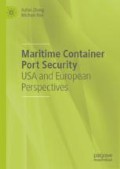Abstract
The Delphi technique is clearly a suitable methodology for primary data collection in the analysis of the impacts of the CSI on EU container seaport competition. Various sources have claimed that the US maritime security initiatives have either positive or negative effects on EU container port competitiveness. Based on that, the conceptual model and related assumptions were developed to achieve the research aim and objectives. The conceptual model structured five assumptions that derived a list of statements, which in turn were used to formulate Delphi round one. This chapter presents the process used to analyse the results from the Delphi survey. It starts with the presentation of the pilot study and then outlines the process of each round of Delphi. The results of the three rounds are presented, including the response rate, the consensus level and formulation of next round statement if one does not reach consensus. For statements that reach consensus level, comments and discussions will be presented in Chapter 7.
Access this chapter
Tax calculation will be finalised at checkout
Purchases are for personal use only
References
Abdel-Fattah, N. (1997). Privatisation of the Road Freight Industry in Egypt and Hungary (PhD thesis). University of Plymouth, UK.
Baker, T. L. (1994). Doing Social Research (2nd ed.). New York: McGraw-Hill.
Cottam, H. (2012). An Analysis of Eastern European Liner Shipping During the Period of Transition (PhD thesis). University of Plymouth, UK.
Cottam, H., Roe, M., & Challacombe, J. (2004). Outsourcing of trucking activities by relief organisations. Journal of Humanitarian Assistance, 1(1), 1–26.
Denzin, N. K., & Lincoln, Y. S. (2011). The SAGE Handbook of Qualitative Research. London: Sage.
Goluchowicz, K., & Blind, K. (2011). Identification of future fields of standardisation: An explorative application of the Delphi methodology. Technological Forecasting and Social Change, 78(9), 1526–1541.
Goodman, C. M. (1987). The Delphi technique: A critique. Journal of Advanced Nursing, 12, 729–734.
Grix, J. (2004). The Foundations of Research. London: Palgrave Macmillan.
Peat, J., Mellis, C., Williams, K., & Xuan, W. (2002). Health Science Research: A Handbook of Quantitative Methods. London: Sage.
Rowe, G., & Wright, G. (1999). The Delphi technique as a forecasting tool: Issues and analysis. International Journal of Forecasting, 15, 353–375.
Von der Gracht, H. A. (2008). The Future of Logistics: Scenarios for 2025. Berlin: Springer Science+Business Media.
Author information
Authors and Affiliations
Corresponding author
Rights and permissions
Copyright information
© 2019 The Author(s)
About this chapter
Cite this chapter
Zhang, X., Roe, M. (2019). The Delphi Research Process. In: Maritime Container Port Security. Palgrave Macmillan, Cham. https://doi.org/10.1007/978-3-030-03825-0_6
Download citation
DOI: https://doi.org/10.1007/978-3-030-03825-0_6
Published:
Publisher Name: Palgrave Macmillan, Cham
Print ISBN: 978-3-030-03824-3
Online ISBN: 978-3-030-03825-0
eBook Packages: Business and ManagementBusiness and Management (R0)

